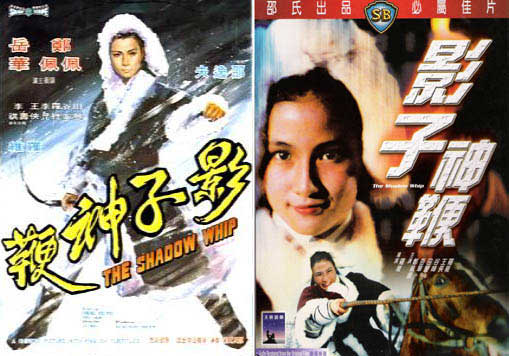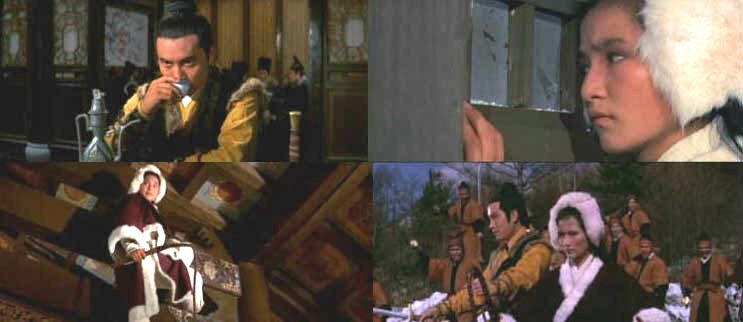Shadow Whip

Reviewed by Yves Gendron
Shaw Brother studio martial art stars Cheng Pei
Pei and Yueh Hua made five swordplays together. King Hu’s seminal classic
COME DRINK WITH ME (July 66) was the first, SHADOW WHIP (Aug 71) made five
years later was the last. For this final pairing, Shaw had their dauntless
heroic couple play out an adventure on an off the path snowy northern setting
and Cheng Pei Pei used a bull-whip as weapon of choice.

In a Northern snowy region of China lives feisty maiden Miss Yun (Cheng Pei
Pei), a master at the whip, which in her hands becomes a truly sharp and
fierce weapon. When some bullying ruffians have forced her to display her
astonishing talent, it attracts the immediate attention of a couple of newcomers
in the region; Wang Jianxia (Yueh Hua), a dashing young knight, and Hong
Dapend (Ku Feng) a piercing eyed, dark-clothed elder swordsman. They are
both searching for Feng Cheng-tian a once famous whip-wielding hero who is
now a fugitive for an odious crime committed fifteen years ago. They wonder
if Miss Yun’s reclusive uncle (Tien Feng), who taught her these skills, is
the man they’re looking for. Thus begins a bloody and convoluted chase where
Miss Yun will learn the truth about her uncle and her own tragic past.

SHADOW WHIP is basically a gimmick movie; “let’s do a winter-set swordplay
and give Pei Pei a whip”. One though that is briskly conducted, splendidly
carried out by its charismatic players and with no less than eight “whipping”
fight scenes within its tight 78 minute running time. The glittering photography
also superbly captures the film’s distinctive snowy scenery that is far more
compelling than its hackneyed, and at times limp plotting.
SHADOW WHIP is one of those rare Shaw Brothers
movies that was shot far from their famed Clearwater Bay studio. In fact,
this must have been a horrendously difficult and utterly gruelling movie to
shoot for its production team not only because they had to go outside their
facilities but into the snowy wilderness to boot (presumably the northern
regions of either Japan or South Korea). The film’s stunt team and action
choreographer also had to face a daunting challenge of their own; namely
how to design a whip centred brand of action. Whips are not a customary weapon
of martial art pictures - not just for one but for a couple of good reasons.
It might be a cool weapon to strike a heroic pose with but the whip is actually
quite unwieldy and very dangerous not only for the ones who are struck with
it, but by the handler as well if he or she is not an expert (which movie
actors rarely are). Moreover, a whiplash goes faster than the speed of sound
and is but a blur to the camera, therefore unlike the sword or the spear,
whips are actually not that suitable for the screen. Finally as it is generally
considered a vicious type of weapon, a hero usually doesn’t look very … heroic
using it.

SHADOW WHIP’s stuntmen and action fixers proved themselves up to the task
however. For a start, they outfitted Pei Pei with a dagger as a secondary
weapon. Also, with the help of occasional wires and editing tricks they came
up with clever and even amusing ways for the heroes to dispatch their opponents.
Even though the film direction remains in itself rather plain, there is a
great use of space, scenery and settings especially in the indoor action
scenes as well as in the bravado sequence where Yueh and Pei Pei are trying
to flee an inn and must fight off an army of opponents. This is unquestionably
the big highlight of the film. Not all is perfect though. As usual, for martial
movies of the period the wire-fu is conspicuously clunky and the later part
of the must-flee-the inn-battle is badly under-cranked which damages the
sequence. Thankfully, it’s a rather short moment.

SHADOW WHIP was made by Lo Wei, the director who filmed Bruce Lee’s first
two k-f movies BIG BOSS (71) and FIST OF FURY (72) and tried to make a Lee
style star out of Jackie Chan. Books written on H-K cinema by two of the
most famous martial art luminaries, especially Jackie’s pretend autobiography
JACKIE CHAN; MY LIFE, have pretty much summed Lo up as a hack whose ego and
blustering temper was inversely proportional to his actual filmmaking talent
and who had the habit of listening to horse racing commentary on the radio
while shooting. The fact remains though that he was at the turn of the seventies
along with Chang Cheh, H-K cinema’s most commercially successful director.
The secret of his success was probably that he let his star’s charisma carry
the movie. This is shown all too well in SHADOW WHIP which beyond the glossy
cinematography remains a rather blandly directed movie whose sparks are mostly
derived from the actors - especially the delightfully feisty and combative
Pei Pei. Supported by the ample resources and the competent technical crew
of H-K's most prestigious studio, Lo Wei’s “laissez-faire” approach worked
quite well during his Shaw Brothers days. It turned against him though once
he left Shaw and found himself working within a more limited, less sheltered
filmmaking environment. A matinee idol early in his film career, Lo Wei usually
gave himself a part in his own movies and in SHADOW WHIP he appears as the
heroine's father in the movie’s flashback.

Lo Wei and Pei Pei made five Shaw Brothers movies together between 1969 and
1971 - all great box-office hits and two more later on in the early seventies
as she tried to make a comeback following her initial retirement as Shaw’s
swordplay queen. In fact SHADOW was actually her last Shaw release and Lo’s
next-before-last before breaking from the studio and going to the greener
pastures of the newly established Golden Harvest. Once there he made two
more swordplays before Shaw finally released SHADOW WHIP in August 1971.
It actually did better box-office business than the earlier Golden Harvest
offerings. One of them THE INVINCIBLE EIGHT (Jan. 71) actually featured whip-wielding
henchmen and the whip was also the weapon of choice for the heroine of another
of Golden Harvest’s early releases, THE FAST SWORD (July 71), which was the
fight choreography directorial debut of none-other than Sammo Hung who himself
had worked earlier as one of SHADOW WHIP’s stuntman and fighting extras.

While some prospective viewers may find SHADOW WHIP too dated and routine
a piece of work, others however may appreciate its tidy efficiency and attractive
snowy settings. It’s especially recommended for Cheng Pei Pei fans
as she really does shine here. Ultimately however, although a reasonably
entertaining piece, the film is still no classic like COME DRINK WITH ME
and purchasing a VCD (5$) rather than a DVD (10$) may make sense.

Rating: Over film all quality 6.5 but fun
factor raise it to 7.








